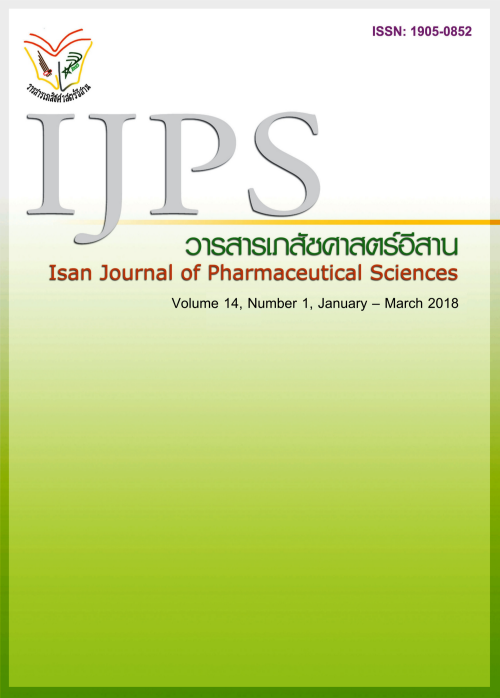Effectiveness of Pharmacist-based Smoking Cessation Program in The Conscripts at Wing 5 Air Base
Main Article Content
Abstract
Introduction: The study of effectiveness of pharmacist-based smoking cessation program in the conscripts at wing 5 air base was an experimental study with control group aiming to assess the effectiveness of smoking cessation program in terms of abstinence rate and number of cigarettes per day at 1 and 3 months. Moreover, factors that influenced smoking and quitting smoking among the conscripts were also evaluated. The data was collected during May to August 2016. Methods: The current smokers in the conscript army were divided into two groups which were experimental and control group. The experimental group received smoking cessation program which included educating about risk of cigarettes and benefit of quitting, motivating to avoid smoking, setting quit smoking plan and providing them thrice counseling therapy according to transtheoretical model, first time was when recruited to the study. Second and third time was at 2nd and 8th week respectively. The control group was given an advice only at the first visit. Outcome was measured by self-report questionnaire and was assured by breath CO. Results: 173 conscripts participated in this study, 85 were in the experimental group and 88 were in the control group. No difference in baseline characteristic was found between both groups. The outcome of this study showed that the experimental group had significantly higher continuous abstinence rate then the control group which was 25.9% and 4.5% at first month and 16.5% and 2.3% at third month in experimental and control group respectively (p<0.05). In aspect of 7-day point prevalence abstinence rate, it was found that the experimental group had significantly higher than control group which was 31.8% and 8.0% at first month and 29.4% and 5.7% at third month in experimental and control group respectively (p<0.05). Numbers of cigarettes per day were decreased from 12.42 + 7.67 and 11.00 + 7.84 at the baseline to 3.75 + 3.80 and 6.83 + 4.69 at the end of study in experimental and control group respectively. The most influencing factor to smoke was relaxing and relieving stress. On the contrary, the most influencing factor to quit smoking was realizing the benefits of smoking cessation. Conclusion: Pharmacist-based smoking cessation program has a promising clinical outcome in term of higher abstinence rate and lower number of cigarettes smoked per day.
Article Details
In the case that some parts are used by others The author must Confirm that obtaining permission to use some of the original authors. And must attach evidence That the permission has been included
References
Boonyawan B, Kaewpan W, Kalampakorn S, Sitdhiraksa N. Effectiveness of A Smoking Cessation Program Applying The Transtheoretical Model for Security Officer in Siriraj Hospital. Kuakarun Journal of Nursing 2012; 19(2): 88-102.
Chaikoolvatana A. The Evaluation of Initiating Tobacco Cessation Services in the Military-Based Hospital, Northeastern Thailand. SMJ 2015; 67(4): 160-7.
Chaleoykitti S, Promdedt S. Predictive Factors of Smoking Behavior Among The Conscript of The Medical Company, Phramongkutlkao Hospital. Journal of The Royal Thai Army Nurses 2013; 14(3): 77-86.
Choeseda A. Smoking Behavior Among Naval Ratings and Responses to The Tobacco Consumption Control Policy of The Royal Thai Navy in Naval Rating Schools. Master of Science (Public Health) Thesis. Bangkok: Mahidol University; 2008.
Dumrongpiwat S. Development and evaluation of pharmacist-based smoking cessation program for youth offenders. Master of Science in Pharmacy Thesis. Bangkok: Chulalongkorn University; 2009.
Kennedy DT, Giles JT, Chang ZG, et al. Results of a smoking cessation clinic in community pharmacy practice. J Am Pharm Assoc 2002; 42(1): 51-6.
Ketgudee L. Stages of Change in Smoking Cessation Behavior Among Conscript Antiaircarft Artillery Division 1. Master of Science (Public Health) Thesis. Bangkok: Mahidol University; 2004.
Kuwalairat P, Sornkate R, Lertsinudom S. Smoking cessation outcome in NCD clinic of Thailand community hospital: Pharmacist-led. IJPS 2016; 11(4): 83-103.
National Statistical Office. The smoking and drinking behavior survey 2014[Online]. 2015 Jun 12 [cited 2017 May 17]. Available from: http://service.nso.go.th/nso/nsopublish/themes/files/smokeFullReport57-1.pdf
Nualsuwan K. Factors related to success in smoking cessation of the infantry. Journal of The Royal Thai Army Nurses 2009; 10(1): 81-90.
Phanucharas D, Chalongsuk R. Survey on Trained Pharmacists’ Practice in Smoking Cessation Counseling. Thai Pharm Health Sci J 2012; 7(3): 115-20.
Rungruanghiranya S, Suntorntham S. Guidelines for Tobacco Use Therapy in Thailand (Revised 2012) for medical and public health workers. Bangkok: Thai Health Professional Alliance Against Tobacco; 2012.
Sajjathram N. editor. Research report: Attitudes and Intention of RatchaphruekCollege’ s Students to Stop Smoking. Bangkok: Ratchaphruek College; 2013. Sponsored by Ratchaphruek College.
Siegel RL, Jacobs EJ, Newton CC, et al. Deaths due to cigarette smoking for 12 smoking-related cancers in the United States. JAMA 2015; 175(9): 1574-6.
Sirirassamee B, Jampaklay A, Holumyong C, et al. editors. Research report: International Tobacco Control Policy Survey – Southeast Asia: ITCSEA (Thailand), Smokers Group, Wave 5 survey 2011. NakhonPathom: Institute for Population and Social Research, Mahidol University; 2013. Sponsored by The US National Institutes of Health (NIH) and Canadian Institute of Health Research (CIHR).
Suankul P. An application of stages of change theory on smoking cessation among the conscripts in Vipawadeeransit camp, Suratthani province. Master of Science (Public Health) Thesis. Bangkok: Mahidol University; 2009.
Thai Health Promotion Foundation. Diseases caused by cigarettes [Online]. 2012 May 30 [cited 2015 Aug 30]. Available from: http://www.thaihealth.or.th/Content/20828-%E0%B9%82%E0%B8%A3%E0%B8%84%E0%B8%97%E0%B8%B5%E0%B9%88%E0%B9%80%E0%B8%81%E0%B8%B4%E0%B8%94%E0%B8%88%E0%B8%B2%E0%B8%81%E0%B8%81%E0%B8%B2%E0%B8%A3%E0%B8%AA%E0%B8%B9%E0%B8%9A%E0%B8%9A%E0%B8%B8%E0%B8%AB%E0%B8%A3%E0%B8%B5%E0%B9%88.html
Thungproun C. The Effect of Self-Management Program on Smoking Behavior Among Non Commissioned Officers. Master of Nursing Science Thesis. Bangkok: Chulalongkorn University; 2004.
Wongwiwatthananukit S. The role of pharmacists in helping patients quit smoking. In: Chindavijak B, Chulavatnatol S, Montakantikul P, Suksomboon N. editors. New Steps for Pharmacists in Outpatient Care. 1st ed. Bangkok: The Association of Hospital Pharmacy (Thailand); 2003. 157-74.
World Health Organization. WHO report on the global tobacco epidemic 2008 [Online]. 2008 Feb [cited 2016 Aug 21]. Available from: http://apps.who.int/iris/bitstream/10665/43818/1/9789241596282_eng.pdf
Zillich AJ, Ryan M, Adams A, et al. Effectiveness of a pharmacist-based smoking-cessation program and its impact on quality of life. Pharmacotherapy 2002; 22(6): 759-765.


